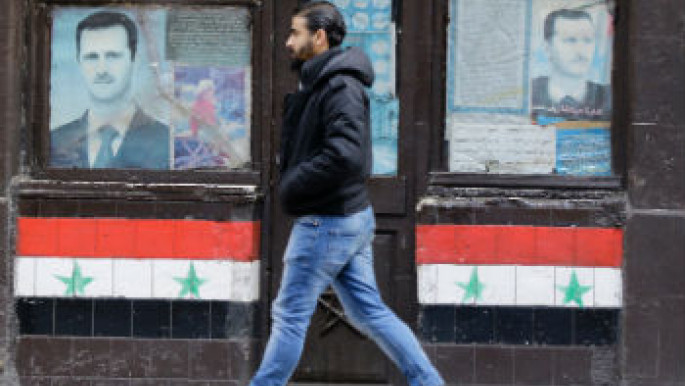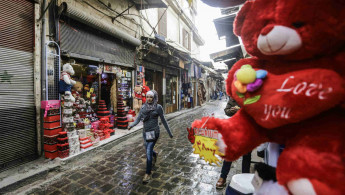Damascus life isn't 'business-as-usual', whatever Assad says
Muhanad, age 23, was grocery shopping at a local outdoor market in Damascus.
The small market splayed along a road too narrow for vehicles, so he rode his bike towards the entrance. A uniformed soldier stepped out in front of him and demanded his ID.
Muhanad scanned the area in front of him and saw a line of men, a number of soldiers, and a beat-up Land Cruiser in the distance, waiting to haul unwitting conscripts off to training camp.
Conscription is mandatory under Syrian law. All eligible men must join President Bashar al-Assad's army.
Conscription checkpoints in Damascus are nothing new, but Muhanad had never before seen one at a market.
"They were almost always static, at fixed locations in town," he said. By now, anyone who might be drafted to serve in the Syrian Army knew to avoid them.
"These young men are quite skilled at avoiding all the checkpoints, and anyone in a uniform in general."
The sneak swoop on the market proved fruitful for the Syrian government. Of the dozen or so men in line with Muhanad, three were eligible to be drafted. They were sent to the waiting Land Cruiser.
One of them, a man of about 20, wailed as he pleaded with others in line to send word to his mother.
"They are sent to boot camp for a few weeks, then they get sent to fight," Muhanad said. "Poorly trained and poorly equipped… literal cannon fodder."
 |
I don't think there are 500,000 left to conscript - no matter how hard they try |  |
Muhanad is on an academic deferment, meaning his compulsory military service is waived while he attends graphic design classes at a local university. He believes that those at risk of being conscripted are too poor to leave, and too poor to buy a deferment.
 |
|
| Young men are a rarity in Damascus, where press gangs and involuntary military conscription are rife [Getty] |
Some reports suggest the regime is attempting to draw in 500,000 men for service, a sum he believes is lofty.
"They've already emptied this city of its most vital male statistic," he said. "I don't think there are 500,000 left to conscript - no matter how hard they try."
Outside of the regime's scramble for eligible soldiers, life for civilians in Damascus is increasingly difficult.
Muhanad reports that those reliant on city water only get it two or three days a week. More often than not, the water they do get is tainted by diesel. Electricity is down to one or two hours a day. The most fortunate have generators, which keeps them afloat - until there is a fuel shortage.
And now, there is another of these fuel shortages.
Most gas stations in Damascus are closed, and the few that are open have queues that stretch for kilometres. People are camping out in their cars for days at a time in hopes of refuelling. As a result of the shortage, food prices are soaring.
Haydar, a 52 year-old physician, echoes many of Muhanad's complaints.
He says doctors are increasingly burdened by shortages of virtually every medicine. Haydar remembers the days when Syria exported medicines and medical supplies. Now, everything must be imported at a premium.
Many people can't afford treatment for common ailments.
"Inflation has crippled the common man," he said. "The government still covers a few things, but people with chronic issues like diabetes… they have to choose between insulin and food. The cost of an MRI is more than what the common man makes in two months."
Haydar often makes house calls. He says these are increasingly made to hotels and commercial-turned-residential rentals as a result of a large-scale depopulation campaign - wherein Syrian civilians are forced out of their homes and replaced with foreigners, chiefly Iranian, Lebanese, and Iraqi militia members and their families.
As opposition-held Syria has become virtually impossible for journalists to safely access, the Assad regime has eased restrictions on foreign journalist visits.
Many major Western outlets have reported from Damascus and its surrounds, but reports on the issues Muhanad highlights are unlikely.
"Of course the journalists aren't seeing any of this," he told The New Arab.
"They're saddled with a government-appointed minder from the moment they land until the moment they leave. I appreciate their good intentions. But no matter how good the intentions, they must realise they are pawns, and their reports will be used to further a very specific agenda."
We are not naming our correspondent for their security.



